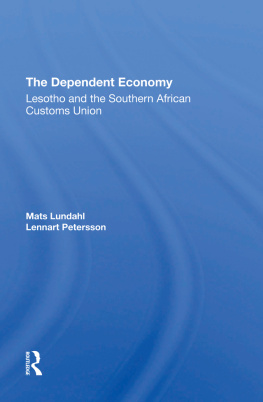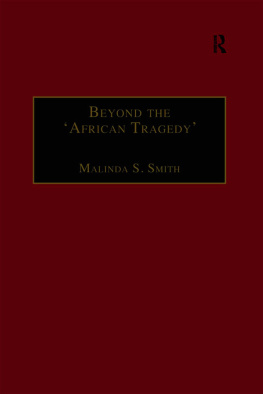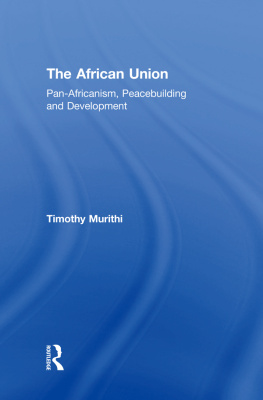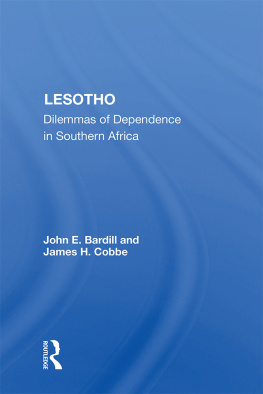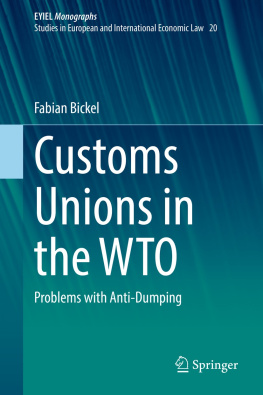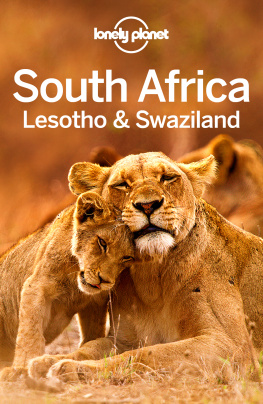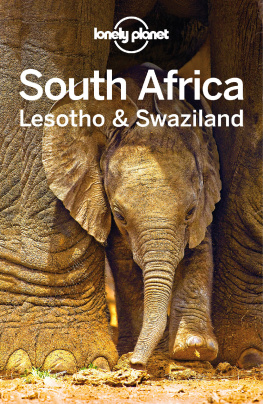First published 1991 by Westview Press
Published 2019 by Routledge
52 Vanderbilt Avenue, New York, NY 10017
2 Park Square, Milton Park, Abingdon, Oxon OX14 4RN
Routledge is an imprint of the Taylor & Francis Group, an informa business
Copyright 1991 by Taylor & Francis
All rights reserved. No part of this book may be reprinted or reproduced or utilised in any form or by any electronic, mechanical, or other means, now known or hereafter invented, including photocopying and recording, or in any information storage or retrieval system, without permission in writing from the publishers.
Notice:
Product or corporate names may be trademarks or registered trademarks, and are used only for identification and explanation without intent to infringe.
Library of Congress Cataloging-in-Publication Data
Lundahl, Mats, 1946
The dependent economy: Lesotho and the southern African customs
union / by Mats Lundahl and Lennart Petersson.
p. cm.
Includes bibliographical references and index.
ISBN 0-8133-8185-1
1. Southern African Customs Union. 2. LesothoForeign economic
relationsSouth Africa. 3. South AfricaForeign economic
relationsLesotho. I. Petersson, Lennart, 1942- . II. Title.
HF2444.Z7L86 1991
337.6885068dc20 91-19339
CIP
ISBN 13: 978-0-367-29123-5 (hbk)
The present study had its beginning in 1985 when two well-known Swedish consultants suddenly found that they did not have the time to write a report on the economic effects on Lesotho of being a member of the Southern African Customs Union. An offer which could not be refused was then given to the authors of this book. The immediate background was the proposal by the South African government that the 1969 customs union agreement ought to be renegotiated.
When our report was completed, we both felt that enough material had been gathered to enable a more ambitious study of Lesotho's economic relations with South Africa. The result is the present book, offered to the readers at a time when there appear to be prospects for genuine political change in South Africa. If this change materializes, the issue of economic integration will most certainly come into focus and then presumably not only for the present members of the Southern African Customs Union, but for a larger number of countries in Southern Africa. Thus, the experience of Lesotho with its powerful neighbor would also have a bearing on a wider issue.
It would not have been possible to write the book without the assistance on many levels of a large number of individuals. Among these we would especially want to acknowledge the following: Lennart Wohlgemuth at the Swedish International Development Authority (SIDA) and Rudolf Jalakas, in 1985 the economic adviser to the Prime Minister's Office in Lesotho, for entrusting us with the original study; Anders Bergquist, formerly at the Department of Economics at the University of Lund, who worked as our assistant; Roy Unge, formerly at the SIDA office in Maseru, both for making all the practical arrangements for us in Lesotho and for reading the entire book manuscript; Erik Karlsson, who succeeded Rudolf Jalakas and who later served as governor of the Central Bank of Lesotho, for providing material and sharing his monetary wisdom with us; and to Jan Boj and Jan Eklf at the Stockholm School of Economics, the former for his meticulous reading of the entire manuscript and the latter for providing us with some of his unique data from Lesotho.
In Lesotho, special thanks are due to Hunsu Kizilyalli, at the time of our first visit in 1985 in the Central Planning and Development Office and who knows the intricacies of the Southern African Customs Union better than anyone and very generously let us have access to all his material. We also benefited greatly from the assistance of L. T. Tuoane, Lesotho Bureau of Statistics; O. T. Maphasa and C. P. Tsasanyane, Department of Customs and Excise; Stefan Schnberg, in 1985 governor of the Central Bank of Lesotho; L. B. Monyake, Robert Kirk, Brendan Martin and Joe Matsau, Lesotho National Development Corporation; B. N. Sebatane, Basotho Enterprises Development Corporation and A. M. Maruping and Michael Sefali, National University of Lesotho. Karin Roxman, Swedish charg d'affairs, and Per Lundell, SIDA's program officer in Maseru, provided all kinds of support during visits in 1990 and 1991.
Mats Karlsson at the Ministry of Foreign Affairs, Bertil Odn and Tore Sellstrm at SID A, Stockholm, read various parts of the manuscript. Setsomi Hoohlo, when visiting the Department of Economics at the University of Lund at the beginning of 1991, was a constant discussion partner. Very special thanks are due to Stefan de Vylder, Stockholm School of Economics, for insisting on reading the entire manuscript (which, of course, he did not) when it was almost in print and insisting on a number of time-consuming changes (most of which, of course, we did not care to make). Siw Andersson and Anja Gonzalez drew all the figures. Alan Harkess corrected our peculiar English under difficult circumstances.
Most of all, however, our heartfelt gratitude goes to Jeanie Petersson, who had to suffer the fate of not only converting our scribbled, illegible handwriting into a camera-ready manuscript but also who never complained, regardless of where, when, or how her impossible task had to be carried out. It is to her that this book is dedicated - for very obvious reasons.
Financial assistance for the project has been provided by the Swedish Agency for Research Cooperation with Developing Countries (SAREC) and by SIDA. The preparation of the final manuscript was greatly facilitated by the kind invitation to Mats Lundahl to spend the spring term of 1991 as a research fellow at the Swedish Collegium for Advanced Study in the Social Sciences (SCASSS) in Uppsala. All this is gratefully acknowledged. Finally, the usual disclaimers apply.
Mats Lundahl
Lennart Petersson
Stockholm and Lund
Introduction
Southern Africa is an area which has been characterized by both conflict and cooperation during the twentieth century. Historical, economic, geographic and political factors have created a number of links between the states and territories in the region but have also revealed a substantial divergence of interests. The most salient structural characteristic has been the domination of the area by South Africa's economic wealth and demands and a dependence of the smaller territories or countries in the region on this country.
Economic integration with the Republic of South Africa affects most areas of southern African society. Since 1910, a customs union has existed between South Africa and the three, small, landlocked countries of Botswana, Lesotho and Swaziland, with the present agreement having been signed in 1969. There is also close integration in the monetary sector. This integration was formalized in the Rand Monetary Agreement between Lesotho, Swaziland and South Africa in 1974 and subsequently in the Common Monetary Area, but long before that a de facto currency union was in operation. The South African rand was the only legal tender in Swaziland, Botswana and Lesotho until the introduction of national currencies in these states in 1974, 1976 and 1980, respectively. It is still the only legal tender in Namibia. A labor agreement has also been concluded between Lesotho and South Africa, laying down the institutional arrangements and present conditions of South African recruitment of Basotho workers. Finally, partly as a result of the currency and customs unions, partly for geographical reasons and a lack of domestic resources, Botswana, Lesotho and Swaziland are closely linked to South Africa through factor and commodity trade.


